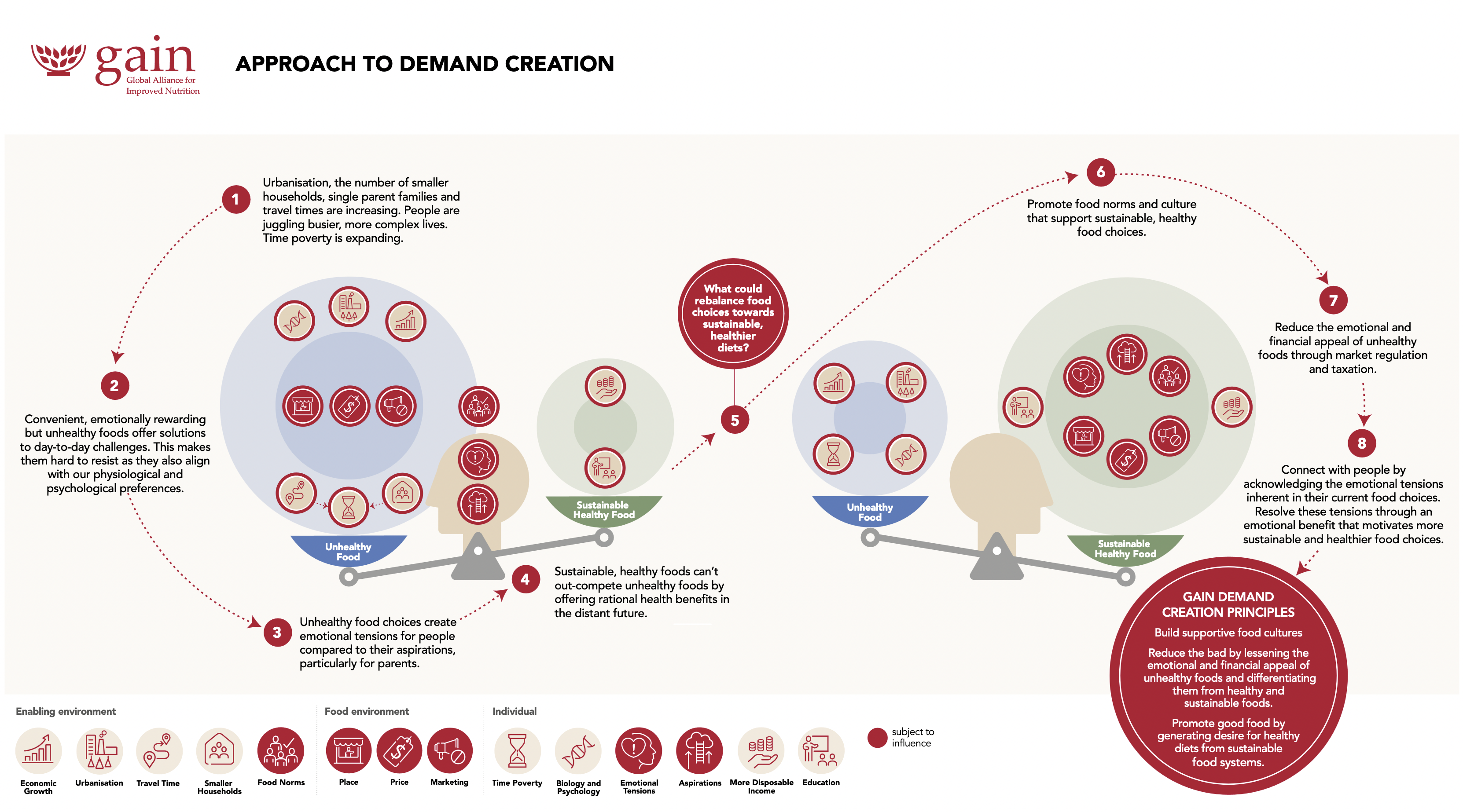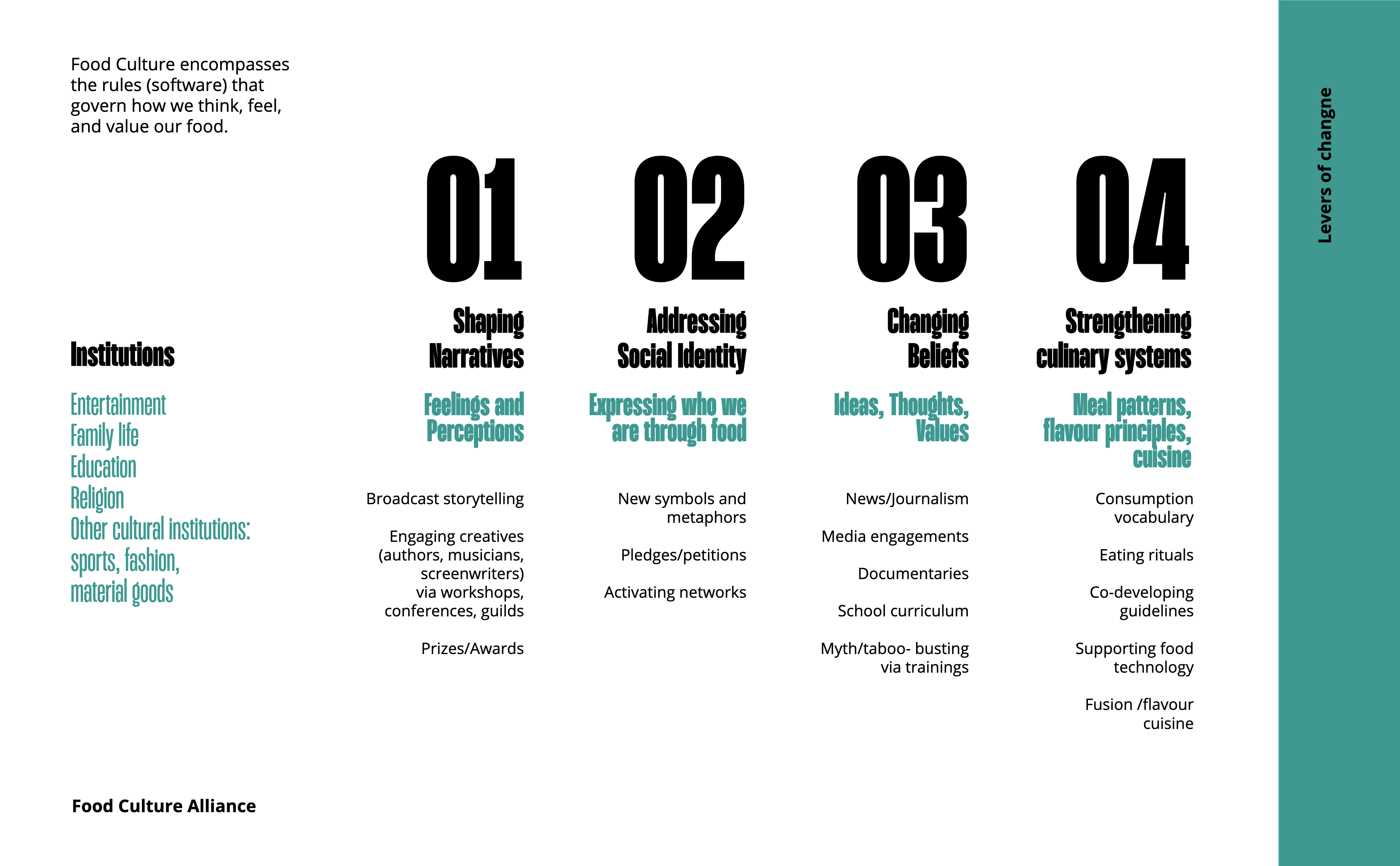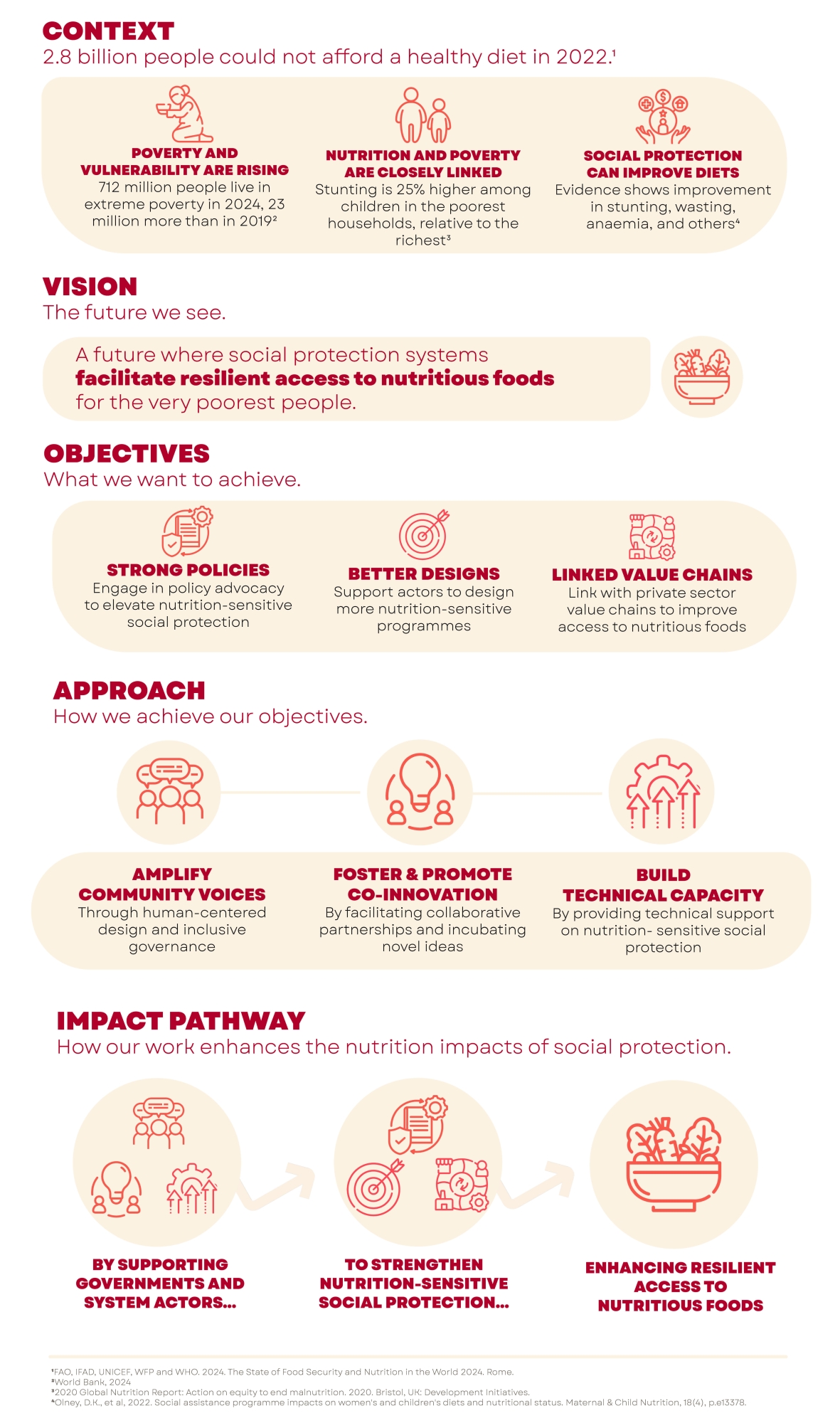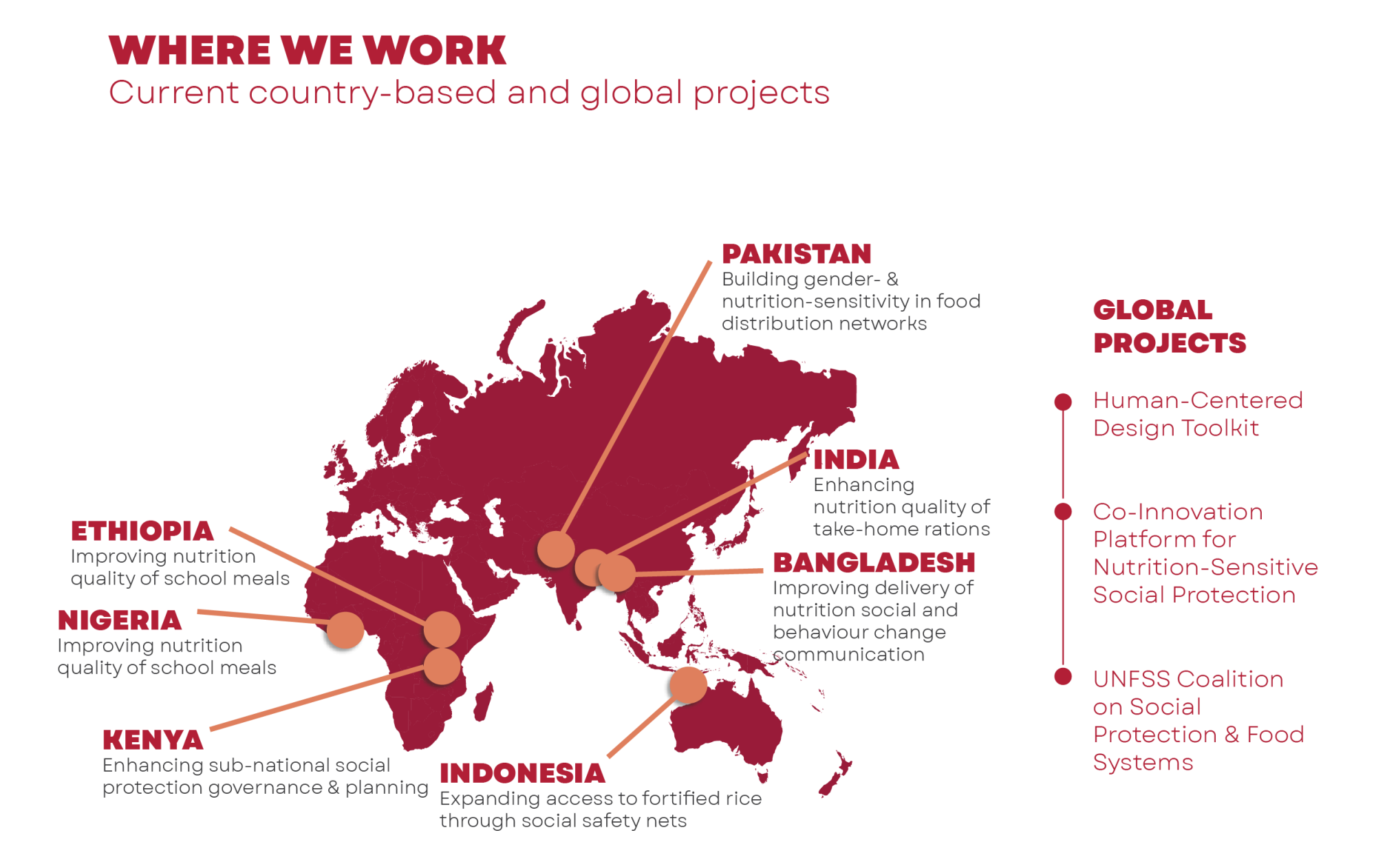Global Diet Quality Project
The Global Diet Quality Project aims to establish the architecture and data necessary for monitoring diet quality on a global scale.
The Global Diet Quality Project aims to establish the architecture and data necessary for monitoring diet quality on a global scale.
The project has developed a reliable and feasible method for data collection, along with a suite of diet quality indicators that encompass both nutrient adequacy and the prevention of non-communicable diseases (NCDs). As of 2024, it has adapted and translated its 5-minute questionnaire, the Diet Quality Questionnaire (DQQ), for use in over 120 countries and has collected nationally representative data in 85 countries across all continents, representing 85% of the global population. The Global Diet Quality Project is a partnership between Gallup, Harvard University, and GAIN.
This project aims to collect dietary quality data in the general adult population across countries worldwide, and to provide the tools for valid and feasible diet quality monitoring within countries. The project enables the collection of consistent, comparable dietary data across countries for the first time.
All data are collected in the Gallup World Poll. The DQQ was administered in national probability-based samples of civilian, non-institutionalized individuals of any gender, aged 15 and older. Data collection occurred either using face-to-face or telephone surveys. Country-specific details of data collection can be found here. The Gallup World Poll is the only survey in the world that covers more than 98% of the world's adult population through annual, nationally representative surveys with comparable metrics across countries.

Head of Office of GAIN Geneva
I‑CAN aims to catalyse climate action for nutrition benefits, and nutrition action for climate benefits
I-CAN presents a new playbook offering step-by-step guidance to embedding nutrition-sensitive ambition and action into nationally determined contributions (NDCs). Drawing on I-CAN experience support climate-nutrition integration in different countries, it highlights practical entry points, resources, and provides policy examples to create nutrition–climate win-wins across food systems, health, agriculture, and social protection. By aligning nutrition with climate goals, countries can strengthen food and health systems, advance progress on the SDGs, and pursue the Paris Agreement 1.5 °C target.
The Initiative on Climate Action and Nutrition (I-CAN) presents a new report that analyses the intersection of biodiversity and nutrition, "Biodiversity and Nutrition Synergies: Evaluating National Biodiversity Strategies and Actions Plans for Integration." The report offers a comprehensive analysis of 192 National Biodiversity Strategies and Action Plans (NBSAPs), revealing the current state of nutrition integration in biodiversity policies worldwide.
The study highlights a significant gap: 62% of NBSAPs show no intentional connections between biodiversity and nutrition. It uncovers regional variations, with Latin America and the Caribbean, Sub-Saharan Africa, and South and East Asia and the Pacific demonstrating higher integration levels, though overall progress remains limited. It looks at how biodiversity and human health are connected. This study is a valuable tool for people working on both environmental and nutrition issues. It offers useful ideas to help make policies and practices better.
I-CAN was launched in 2022 during COP27 by the Presidency of Egypt, and is co-chaired by Egypt and GAIN, with core partners including WHO, FAO and the SUN movement. I-CAN gained significant attention in 2023, being featured at various high-level international events and mentioned by the Director-Generals of both WHO and FAO during COP28 in Dubai. In 2024, I-CAN will focus on providing national-level support to country governments.
Please click here to read the key findings and full pdf of the I-CAN 2023 baseline report, which highlights the current state of integration between climate change and nutrition across a range of indicators, including in action, data and evidence, policies, and investments.
The Executive Summary of the I-CAN baseline report is available also in French, Spanish and Arabic.

Lead, Environment and Nutrition

Lead, Initiative on Climate Action and Nutrition (I-CAN)

Executive Director’s Office Analyst
All foods are not created equally—some have exceptionally high levels of one or more nutrients that are important to human health, and, if consumed in greater quantities, could contribute significantly to improving dietary quality among population groups most vulnerable to malnutrition. Under this programme of work, GAIN has set out to: identify high-potential foods in the countries where we work; to understand the cultural and economic constraints to higher consumption, and to design and implement integrated solutions that will result in higher consumption. Some of this work includes crop and plant varieties unique to particular settings that are no longer commonly consumed, despite their nutritional value.
A number of foods are particularly rich in the nutrients that are commonly lacking in resource-poor populations such as iron, zinc, folate, vitamin A, calcium, and vitamin B12. Priority foods for improving dietary quality have been identified by GAIN researchers Ty Beal and Flaminia Ortenzi. When examples of these priority foods are also accessibly priced and can be produced in an environmentally sustainable manner, they become prime candidates for efforts to increase access and consumption by vulnerable groups.
Numerous barriers have been identified that prevent consumers from accessing these foods; they occur at all stages of the supply chain from production inputs right through to household behaviours. GAIN’s approach to analysing supply chain blockages is described here. More recently, we have used systems dynamics modelling to understand the potential of different intervention strategies. We also always use qualitative research methods to understand consumer motivation and behaviour.
Building on these insights, in 2022, GAIN began to implement a new generation of large projects targeting priority food value chains. Each project works on all of supply, demand, and the enabling environment and builds on existing investments to strengthen the relevant value chains. All of these projects will be assessed on their ability to change consumption frequency and quantity among low-income consumers, and the largest projects under this programme aim to improve the diets of over one million consumers.
Currently, we are working on: vegetables in Kenya, Benin and Uganda; milk and other dairy products in Ethiopia, and animal-source foods (eggs, poultry, and small dried fish) in Mozambique.

Chief Technical Officer
Large-scale food fortification (LSFF) is a key part of the response to the crisis of malnutrition, adding one or more essential nutrients to widely and regularly consumed foods during processing. This impactful and cost-effective intervention can reach billions of people by making commonly consumed foods such as wheat and maize flour, rice, edible oil, and condiments such as salt more nutritious, combatting vitamin and mineral deficiencies and protecting human health.
GAIN supports food fortification at global, regional and country levels. In collaboration with our Thriving Nutrition Enterprises programme, we aim to empower fortified foods producers with a whole-of-business approach to fortification, combining fortification quality assurance and control with business support services such as supply chain management, product development, and marketing to incentivise fortified foods producers. We also facilitate development or strengthening of policies, legislation, governance and institutions to deliver quality fortified foods.
Since 2002, GAIN has supported the roll-out, or strengthening of food fortification in approximately 40 low and middle-income countries, investing approximately USD 300 million in grants and technical assistance. As a result of these efforts, we have contributed to mandatory fortification legislation in numerous countries. Over one billion individuals have sustained access to fortified foods in current GAIN supported programmes, including the GAIN Premix Facility.
LSFF is not a silver bullet to solve the crisis of malnutrition, but it is an essential component of national and regional nutrition strategies which works best when it is mandated as part of a comprehensive public nutrition strategy. Where national mandatory fortification programmes have been implemented well and reached high coverage and quality, they have significantly decreased micronutrient deficiencies.
GAIN is committed to supporting the United Nations Sustainable Development Goals by improving access to fortified foods to 1.2 billion people by 2025.
GAIN works to support and strengthen LSFF programmes as a key component of national nutrition and food systems strategies.
LSFF works best when governments enact mandates, requiring that widely consumed foods and condiments are fortified with essential vitamins and minerals.
GAIN works with food producers, governments, academia and civil society stakeholders, supporting these national actors to:
Regionally, GAIN facilitates and strengthens human capacity and systems strengthening for production, regulatory and impact monitoring of fortified foods. We also support initiatives to improve trade and regional markets for fortified foods collaborating with organisations such as the East, Central and Southern Africa Health Community (ECSA-HC) on systems strengthening across its member states, Southern African Development Community on development of regional minimum standards for fortified foods and Smarter Futures on scaling up food fortification in Africa. Under the UNICEF-GAIN Brighter Futures partnership, we supported South Asia Association of Regional Cooperation (SAARC) prioritizing salt iodization as one of the interventions in SAARC's nutrition action framework as well as harmonised standards for salt iodization for the West Africa Economic and Monetary Union (UEMOA) region which were subsequently extended to the Economic Community of West African States (ECOWAS). Check out a map on GAIN LSFF Technical Assistance to Regional Communities.
Fortification initiatives, tools or platforms with fortification data developed by GAIN, alone or in partnership with other organisations.
These include:

Programme Lead, Large Scale Food Fortification
GAIN’s overall vision is to scale up production and availability nutrient enriched crops and reach 120m consumers in Africa and Asia by 2027.
Since 2019, GAIN has been supporting the scaling up of nutrient-enriched crops, also known as biofortified crops, in Africa and Asia to improve the intakes of micronutrients or nutrients necessary for healthy growth and development. These micronutrient rich crops are developed through conventional breeding techniques (they are not genetically modified) to increase their density of iron, zinc, or vitamin A – all critical micronutrients for maintaining good health. They are also bred with other traits for improved productivity and resilience as demanded by farming communities such as high yield, drought tolerance, and resistance to disease and pests. GAIN currently supports the scaling up of a variety of nutrient enriched crops including iron enriched beans, zinc enriched rice and wheat and vitamin A enriched maize, cassava and sweet potatoes.
Our work in nutrient enriched crops involves a wide range of stakeholders across the agricultural value chains such as governments and policy makers, agricultural research institutes, seed producers, farm inputs agro-dealers, farmers, agricultural extension workers, aggregators, food processors and other market actors involved in procurement and marketing of nutrient enriched crops and foods such as wholesalers and retailers as well as institutional buyers such as school feeding programmes.
Seed systems: partnering with research institutes and seed companies on scaling up nutrient enriched seed production and agro-dealers on availability and accessibility of the seeds to farmers.
Scaling up nutrient enriched crops production - working through farmers groups or farmer mobilization organizations and extension workers to scale up production of nutrient enriched crops.
Demand creation and markets – working with both farmers on uptake of nutrient enriched crops as well as consumers and institutional buyers on benefits of nutrient enriched foods to create demand. The work also involves connecting farmers to markets and supporting aggregation models for nutrient enriched crops. In addition, we also support food processors on product and market development for nutrient enriched foods.
Enabling environment – partnering with governments on policies, standards and regulations to support uptake of nutrient enriched crops and integration of these crops and foods in government procurement, social safety net programmes and other institutional programmes such as school feeding.
Sustainability – promoting production of nutrient enriched crops as a climate adaptation intervention in light of the fact that CO2 emissions are leading to reductions in the micronutrient content of crops. In addition, we also work with farmers on good agronomic practices and climate smart agricultural practices in partnership with agricultural extension workers.
Livelihoods and inclusion: GAIN and its partners support capacity building of smallholder farmers and agri-food entrepreneurs, with a special emphasis on women and youth, along nutrient enriched crops supply chains by equipping them with entrepreneurial skills, providing business support services such as aggregation, market linkages, product development and processing as well as improving access to finance for those running nutrient enriched crops enterprises.

Programme Lead, Nutrient Enriched Crops
We believe consumers everywhere deserve to make food choices that are healthier and environmentally more sustainable. The demand programme exists to make that goal a reality for urban lower income consumers and rural consumers. We equip consumers with both the motivation and the confidence to make healthier choices whenever they buy or eat food.

On the horizon is a new project to determine how we can create demand among rural households who are both producers and consumers of food.
Learn more here about the science and theories that have informed our overall approach.
To learn more about labelling that helps consumer make better choices read our discussion paper and convening paper.

Programme Lead, Consumer Demand Generation
Our global food system has shaped societal preferences in favour of consuming unhealthy and unsustainable foods, fuelling poor health and accelerating climate change. We need radical, accelerated transformation in our consumption habits across society to combat this. Food culture impacts the way society thinks and feels about and values certain foods, and it has a profound impact on consumption habits. Yet, food culture remains unexplored and underutilised.
The Food Culture Alliance has been established with a single vision – a world where society’s preference is for nutritious and sustainable foods. Our mission is to champion food culture and leverage the toolbox of strategies it provides to shift preferences and increase society’s demand for nutritious and sustainable foods.
The Food Culture Alliance framework provides further information on the social and cultural strategies the alliance aims to deploy.
.
The Food Culture Alliance secretariat is hosted by GAIN and co-led by EAT and the Global Business School Network. We are establishing Alliances in Kenya, India, and Indonesia.
Our 3-pillar operating model is set to deliver on the Food Culture Alliance’s mission:
Visit the Food Culture Alliance website for further information on our approach and work. The Food Culture Alliance is a key component of the Consumer Demand Generation Programme.

Programme Lead, Consumer Demand Generation

Senior Associate, Food Culture Alliance
Millions of people around the world struggle to afford minimally nutritious diets, and social protection is critical for making healthy diets accessible. GAIN supports governments and other key stakeholders to accelerate system innovations that can make social protection investments work harder for the nutrition of the most vulnerable.
Through partnerships, policy advocacy, and programmes, GAIN is working in seven countries to make social protection systems more nutrition-sensitive and better equipped to combat systemic and intergenerational inequities that limit the reach of vital services.
GAIN's social protection programme currently encompasses the following synergistic work areas:
GAIN's work in these areas seeks to improve both the delivery and effective utilisation of nutrition services in social protection systems, ensuring that recipients attain the intended nutritional benefits. We believe that improving the delivery and utilisation of nutrition-sensitive social protection is key to achieving longer-term dietary resilience for the most vulnerable households.
Our social protection programme is rooted in four guiding principles: gender sensitivity, human centeredness, sustainability, and climate-awareness. These principles serve as lenses through which we view our work, and to which we hold ourselves accountable.



Technical Officer
For over ten years, GAIN has been supporting micro-, small, and medium-sized enterprises (MSMEs) in nutritious food value chains to grow, innovate, and meet the needs of vulnerable consumers.
Over 1000 MSMEs have been supported across nearly all of GAIN’s programme countries and covering input suppliers, primary producers, distributors and wholesalers, as well as retailers. Some example beneficiary companies are featured HERE.
GAIN’s support has included basic business development services, technical assistance for food safety, processing and product formulation, marketing and the like, as well as financial assistance in the form of small grants. (Our non-grant financial support is covered under Nutritious Food Financing). Four big projects delivered these interventions:
Implemented in Mozambique, Kenya, Rwanda, and Tanzania from 2013 to 2020, GAIN’s Marketplace for Nutritious Foods Programme focused on supporting SMEs in nutritious food value chains to develop profitable business models and sustainably bring nutritious and safe foods to markets. The Marketplace’s two-pronged approach supports a broad network of stakeholders with information and knowledge, through the “Community of Practice”, while targeted technical and financial support offers promising, innovative enterprises through the “Innovation Accelerator”.
“Keeping Food Markets Working” (KFMW) was set up as an emergency response programme to protect and sustain food systems in the face of COVID-19. It provided rapid support to food system workers, SMEs supplying nutritious foodsThe 18 months rapid response supported SMEs in Nigeria, Kenya, Mozambique, Tanzania, Rwanda, Ethiopia, Bangladesh, and Pakistan.
In 2016, GAIN and its partners spotted a gap in postharvest loss interventions targeted to a) nutritious foods and b) working in the supply chain beyond the farm. The Postharvest Loss Alliance for Nutrition (PLAN) was launched in Nigeria. While a significant amount of food loss occurs on-farm, many agriculture organisations are making progress with farmers to reduce these losses. PLAN added value by supporting SMEs post-farmgate in Ethiopia, Indonesia, and Nigeria over 5 years (2016 – 2020). It brought together public and private sector actors to collectively reduce loss of nutritious foods, boosting livelihoods of suppliers while increasing availability and affordability of nutritious and safe foods for consumers.
Through the Nutrition Impact at Scale (NIS) Project, GAIN partners with Enterprise Support Organisations (ESOs) to scale the impact of its work to increase access to safe and nutritious foods, especially for low-income consumers. Funded by The Ministry of Foreign Affairs of the Netherlands over five years (January 2022 – December 2026), the project uses a Market Systems Development approach to improve food systems, increase inclusivity, and ultimately, nutrition outcomes. It leverages the extensive experience GAIN has developed over the years of providing quality technical assistance, networking, knowledge sharing, building capacity of partners, and the provision of various tools and resources to Small and Medium Businesses (SMEs)to attach a ‘nutrition lens’ to the work of ESOs Nigeria, Benin, Uganda, Ethiopia, Mozambique, and Kenya
While Small and Medium-sized Enterprises (SMEs) play a substantial role in bringing foods to market, their success is hindered by several constraints, including a lack of financial and technical capacity to improve and grow their businesses.
Most of the food that is produced, processed, transported, and sold in the Global South is handled by small- and medium-sized enterprises (SMEs). While SMEs play a substantial role in bringing foods to market, their success is hindered by several constraints, including a lack of financial and technical capacity to improve and grow their businesses. Women-led enterprises face additional constraints, as there is a large gender gap in access to business finance across many world regions, exacerbating the already challenging act of securing financing for a business in the agri-food sector.
According to the IFC, the estimated global gap in SME funding is $5.7 trillion. "Owners and entrepreneurs report access to capital to be one of their toughest challenges, one that sometimes outranks electricity shortages and other concerns". Without sufficient access to financial services, SMEs are unable to expand operations and market reach, enhance the nutritional value of their products, improve on their food safety standards or start working more sustainably.
Further, there is a lack of awareness within investment communities on the importance of nutrition and of the additional impact that nutrition investing can contribute to, beyond SDG2, including gender equality, children growth and development.
To ensure that all people can access a safe, healthy and diverse diet, there is need for: i) global influencing on nutrition investing; and ii) innovative methods of resource mobilisation that focus on nutrition and SMEs.
Through our global influencing work, we aim to improve awareness, capacity, and commitment among investors to support the development of nutrition as an investment theme. Our goal is to scale the impact of our work , seeking to influence others (investors, donors, governments, and Development Finance Institutions (DFIs)) to adopt a nutrition lens to the work that they’re doing. We will lead on evidence-based advocacy on the link between gender and nutrition in the investment space, as well as child lens and nutrition investing. We will also leverage the approaches and learnings from the Nutritious Foods Financing Facility - N3F.
The N3F is an innovative blended finance approach that aims to overcome SMEs' constraints by providing financial support and building technical capacity within high-potential SMEs that produce foods available to lower-income consumers in Sub-Saharan Africa (SSA). The goal is to transform the capacity of these SMEs to deliver nutritious foods in Africa through a blended finance approach comprised of a financing facility with requisite technical assistance. N3F acts as a proof-of-concept, aiming to prove that financing nutritious foods through SMEs works and providing a pathway forward for larger scale transformation.

The N3F Fund: Launched in December 2023, the N3F fund is an impact-first fund with consumer nutrition at its core and a blended finance structure, which provides debt financing to SMEs providing safe and nutritious foods to local consumers in SSASSA Sub-Saharan Africa. Managed by Incofin Investment Management, with GAIN providing nutrition expertise.
Technical Assistance: Provision of technical assistance to the Fund's investee SMEs, focusing on 1) general business management practices to support SMEs to become more efficient and financially sustainable, providing assistance such as business planning and strategy development; and 2) impact enhancement and food safety, such as product formulation, labelling and supply chain strengthening, to ensure, improve and oversee SMEs’ nutrition impact, as well as gender equity and environment. Through this technical assistance, the N3F aims to help SMEs reach their potential and become more effective and efficient, thereby increasing their ability to serve domestic markets. Managed by GAIN.
Monitoring, Assessment and Learning: This component focuses on convening and influencing stakeholders, knowledge dissemination and the development and validation of metrics for targeting nutrition-sensitive investments. Managed by GAIN.
The technical assistance and monitoring, assessment and learning component are grant-funded separately from the N3F fund.
N3F is committed to financing 60 nutritious food SMEs across 15+ countries in SSA (Sub-Saharan Africa), aiming to reach between 7–10 million end consumers with safe, nutritious foods.
Beyond the N3F, we aim to explore other opportunities for innovative financing to scale nutrition impact, i.e. outcome-based financing and incentive-based impact-linked finance.

Senior Lead, Innovative Finance for Nutrition

Manager, Nutritious Foods Financing (N3F) Technical Assistance and Innovative Finance